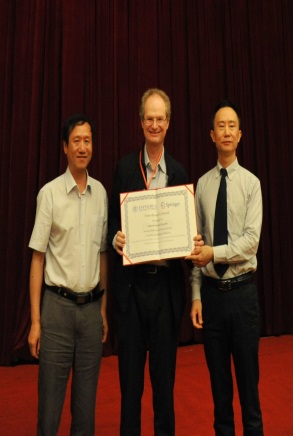Paul Alivisatos, Director of the Lawrence Berkeley National Laboratory and the University of California (UC) Berkeley's Samsung Distinguished Professor of Nanoscience and Nanotechnology, has received the second Tsinghua University Press – Springer Nano Research Award. The award ceremony took place at the 2015 Sino-US Nano Forum, held from June 25-28 in Wuhan, China.
Shuai Yan, Director of Journal Publishing of Tsinghua University Press, and Lu Ye, Managing Director and Editorial Director of Springer China, presented the award certification to the scientist. Hongjie Dai, Editor-in-Chief of Nano Research, and Xiaogang Peng and Xiangfeng Duan, both Associate Editors of Nano Research, jointly presented Alivisatos with the award medal.
 Photo from left to right: Shuai Yan, Paul Alivisatos, Lu Ye
Photo from left to right: Shuai Yan, Paul Alivisatos, Lu Ye
Paul Alivisatos is an award-winning chemist and internationally recognized authority on the fabrication of nanocrystals and their use in solar energy applications. His research breakthroughs include the synthesis of size- and shape-controlled nanocrystals, and forefront studies of nanocrystal properties, including optical, electrical, structural and thermodynamic. In his research, he has demonstrated key applications of nanocrystals in biological imaging and renewable energy. For his exceptional scientific accomplishments, Alivisatos has been awarded the prestigious Wolf Prize in Chemistry for 2012, and elected as a member of the National Academy of Sciences and the American Academy of Arts and Sciences.
Nano Research is an international academic journal sponsored by Tsinghua University and the Chinese Chemical Society, and is jointly published by Tsinghua University Press and Springer. Its 2014 impact factor was 7.010.
The Tsinghua University Press – Springer Nano Research Award, established by Nano Research along with Tsinghua University and Springer in 2013, is awarded for outstanding contributions to nano research by an individual scientist. The award is accompanied by a cash prize of US $10,000. The winner is determined by the Award Committee (editors-in-chief, associate editors, representatives from Tsinghua University Press and Springer) after receiving nominations from the members of the editorial board of Nano Research. Charles M. Lieber of Harvard University, one of the world’s leading scientists in nanoscience and nanotechnology, received the first-time honor in 2014.
Source: http://www.springer.com